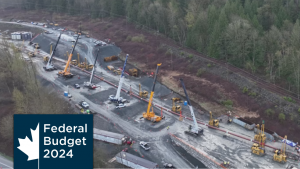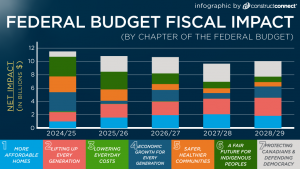VANCOUVER – The government of Canada has announced the Trans Mountain pipeline will go forward but industry stakeholders and academic experts see a bumpy road ahead for the project.
Prime Minister Justin Trudeau said on June 18 the federal government has approved the Trans Mountain Expansion project and that every dollar generated earned by the government from the project will go towards funding Canada’s transition to clean energy.
“We have a responsibility to ensure that the decisions we make today move us toward a cleaner, sustainable economy. Major resource projects can move forward, but only if we do so in a way that protects the environment and respects Indigenous rights,” Trudeau said.
“The TMX project is a significant investment in Canadians and in Canada’s future that will create thousands of good, middle class jobs, maintain the highest environmental standards, and fund the clean energy solutions that Canada needs to stay competitive on the global stage,” he added.
Industry reaction to the announcement in western Canada was cautiously optimistic.
“We’re happy it’s been approved. It’s great news for the energy economy and for the hundreds of construction workers who’ve started work on the project,” Independent Contractors and Businesses Association (ICBA) president Chris Gardner said.
“It’s also great news in terms of opportunities that will flow from getting Canada’s energy to market for places other than the United States, and for First Nations to talk about ownership in the project,” Gardner added.
While Gardner was pleased the project is going ahead, he said progress has been slow.
“Canada has gained a reputation that it’s difficult to invest here. Our economy is being hollowed out because investors go to other jurisdictions,” he said.
He added that no country harnesses energy more safely and sustainably than Canada, and that officials should take advantage of that opportunity.
A release from Canada’s Oil and Natural Gas Producers (CAPP) voiced support for the federal government’s decision to approve the pipeline and said it would finally clear the way for access to overseas markets.
“The Trans Mountain Expansion Project is a step in the right direction toward offering a longer-term solution to improve investors’ confidence in Canada,” the statement said, and estimated an average incremental annual investment of $20 billion in the oil and gas sector and an extra $45.4 billion in economic activity by 2030.
CAPP also stressed the high ethical, safety and production standards of Canadian stakeholders compared to other producers across the globe.
“The world needs more energy and a significant amount currently comes from sources that do not have Canada’s environmental and social standards. Canada can now seize this opportunity to be a leader in supplying responsibly produced energy to a growing global middle class, displacing fuels produced from other jurisdictions with lower or no standards,” the CAPP statement said.
Progressive Contractors Association (PCA) British Columbia regional director Rieghardt Van Enter echoed CAPP’s contention that Canada’s high standards will deliver a superior pipeline system in both economic and social terms.
“We need to get past the conflict and figure out that this will be one of the safest, most well-run and cleanest facilities of its kind Canada has ever seen,” Van Enter added.
“We have to trust our fellow Canadians to do the right thing, which is to do it in an environmentally sustainable way,” he said.
PCA president Paul de Jong urged the federal Liberals and Prime Minister Justin Trudeau not to politicize the Trans Mountain decision as part of their fall election campaign and pointed to upcoming resource industry-focused bills such as C-48 and C-69 as impediments to future pipeline construction.
“We’ll believe this project is moving forward when the shovels are finally in the ground. While today’s decision is the right one, it’s far from a ringing endorsement when the government is working so hard to kill major resource projects through legislation and regulations designed to make energy development less likely in the future,” de Jong said.
Bill C-48 would ban oil tankers carrying more than 12,500 metric tonnes of crude oil from stopping at ports along B.C.’s north coast hampering Canadian export capacity and Bill C-69 which concerns regulations surrounding the energy industry will “bog down major projects and drive up costs and uncertainty,” he said.
“We’re urging the federal Liberals not to use Trans Mountain as a pawn in their re-election bid this fall,” added de Jong. “With thousands of jobs, billions in economic benefits and Canada’s credibility on the line, there’s too much at stake not to get this project built now, not months from now after an election.”
University of British Columbia School of Public Policy and Global Affairs professor George Hoberg said the Trans Mountain pipeline project will not be affected by Bills C-48 and C-69 as it began under the regulations currently in place.
The crux of whether Trans Mountain will proceed depends not on federal or provincial politics, he added, but in the result of new legal action by First Nations affected by the project.
“What I’m looking for next is what happens with that court decision,” Hoberg said.
The Federal Court of Appeal previously halted the Trans Mountain project in August 2018 when it found the federal government had not adequately consulted and accommodated First Nations peoples affected by the pipeline and that the National Energy Board should not have excluded increased marine traffic in its assessment.
The federal government engaged in a new round of consultations with Indigenous groups before the June 18 announcement.
Hoberg added work on the project in B.C. might have unintended political consequences.
“Politically, Trans Mountain will want to show progress by showing shovels in the ground. If that happens in B.C., there will be immediate physical protest by long-term opponents of the project,” he said.











Recent Comments
comments for this post are closed